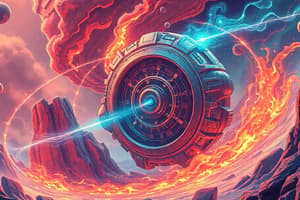Podcast
Questions and Answers
What does the First Law of Newton's motion state?
What does the First Law of Newton's motion state?
- An object in motion will stay in motion unless acted upon by a force. (correct)
- The force required for motion depends on the friction present.
- An object at rest will spontaneously move if pressure is applied.
- An object will always accelerate when a force is applied.
Which of the following is a characteristic of electric fields?
Which of the following is a characteristic of electric fields?
- They can only exist in a vacuum.
- They produce sound waves.
- They have no impact on magnetic fields.
- They exert forces on other charges within their area. (correct)
What is described by the Second Law of Thermodynamics?
What is described by the Second Law of Thermodynamics?
- Heat cannot spontaneously flow from a cold body to a hot body. (correct)
- Energy can be created and destroyed under certain conditions.
- Entropy of an isolated system remains constant.
- Work can be converted into energy without loss.
Which principle states it is impossible to know both the exact position and momentum of a particle simultaneously?
Which principle states it is impossible to know both the exact position and momentum of a particle simultaneously?
Maxwell's Equations are essential in describing the interactions between which two entities?
Maxwell's Equations are essential in describing the interactions between which two entities?
In the context of waves, which type involves the transfer of energy without a medium?
In the context of waves, which type involves the transfer of energy without a medium?
What phenomenon occurs due to gravity according to General Relativity?
What phenomenon occurs due to gravity according to General Relativity?
Which application of physics utilizes imaging techniques like MRI and X-rays?
Which application of physics utilizes imaging techniques like MRI and X-rays?
Flashcards are hidden until you start studying
Study Notes
Overview of Physics
- Branch of science concerned with the nature and properties of matter and energy.
- Studies the fundamental forces of nature and the interactions between them.
Key Concepts in Physics
1. Mechanics
- Kinematics: Study of motion without considering forces. Key equations describe relationships between displacement, velocity, acceleration, and time.
- Dynamics: Examines forces and their impact on motion. Newton's Laws of Motion are foundational:
- First Law (Inertia): An object at rest stays at rest, and an object in motion stays in motion unless acted on by a force.
- Second Law (F=ma): Force equals mass times acceleration.
- Third Law (Action-Reaction): For every action, there is an equal and opposite reaction.
2. Thermodynamics
- Study of heat, energy, and work.
- Key laws:
- First Law: Energy cannot be created or destroyed (Conservation of Energy).
- Second Law: Entropy of an isolated system always increases; heat cannot spontaneously flow from cold to hot.
3. Electromagnetism
- Interactions between electric charges and magnetic fields.
- Key components:
- Electric Fields: Area around a charged particle where it exerts force on other charges.
- Magnetic Fields: Region around a magnet where magnetic forces can be felt.
- Maxwell's Equations: Describe how electric and magnetic fields interact.
4. Waves and Optics
- Waves: Disturbances that transfer energy through space/time.
- Types: Mechanical (sound), electromagnetic (light), and matter waves.
- Optics: Study of light behavior, including reflection, refraction, and diffraction.
5. Quantum Mechanics
- Governs the behavior of particles at atomic and subatomic levels.
- Key principles:
- Wave-Particle Duality: Particles exhibit properties of both waves and particles.
- Uncertainty Principle: It is impossible to simultaneously know the exact position and momentum of a particle.
6. Relativity
- Special Relativity: Formulated by Einstein; focuses on observers moving at constant speeds.
- Key concepts: Time dilation and length contraction.
- General Relativity: Describes gravity as the curvature of spacetime caused by mass.
Applications of Physics
- Engineering: Design and analysis of structures, machines, and systems.
- Medicine: Imaging techniques (e.g., MRI, X-rays) and radiation therapies.
- Astronomy: Understanding celestial phenomena and the universe's structure.
Notable Physicists
- Isaac Newton: Laws of motion and universal gravitation.
- Albert Einstein: Theory of relativity and contributions to quantum theory.
- Niels Bohr: Development of atomic structure and quantum mechanics.
Study Tips
- Understand key formulas and their applications.
- Solve practice problems to reinforce concepts.
- Relate physical phenomena to real-world applications for better retention.
Overview of Physics
- Physics explores the nature and properties of matter and energy, focusing on fundamental forces and their interactions.
Key Concepts in Physics
Mechanics
- Kinematics: Analyzes motion without considering the forces involved, utilizing key equations linking displacement, velocity, acceleration, and time.
- Dynamics: Investigates the relationship between forces and motion, foundationally supported by Newton's Laws:
- First Law (Inertia): An object remains at rest or in uniform motion unless influenced by an external force.
- Second Law (F=ma): The acceleration of an object is directly proportional to the net force acting on it and inversely proportional to its mass.
- Third Law (Action-Reaction): Each action force has an equal and opposite reaction force.
Thermodynamics
- Explores the principles of heat, energy, and work.
- First Law: States energy cannot be created or destroyed, embodying the conservation of energy principle.
- Second Law: Indicates that the entropy, or disorder, of an isolated system always increases, and spontaneous heat transfer does not occur from cold to hot.
Electromagnetism
- Examines how electric charges interact with magnetic fields.
- Electric Fields: Surround charged particles, influencing other charges within the area.
- Magnetic Fields: Regions around magnets where magnetic forces are exerted.
- Maxwell's Equations: Four fundamental equations that frame the interdependency of electric and magnetic fields.
Waves and Optics
- Waves: Defined as disturbances transferring energy through space and time, categorized into mechanical (e.g., sound), electromagnetic (e.g., light), and matter waves.
- Optics: Investigates light's behavior, including phenomena such as reflection, refraction, and diffraction.
Quantum Mechanics
- Governs the behaviors of particles at atomic and subatomic scales, introducing critical principles:
- Wave-Particle Duality: Particles can display characteristics of both waves and particles depending on observation.
- Uncertainty Principle: Asserts the impossibility of simultaneously knowing a particle's precise position and momentum.
Relativity
- Special Relativity: Developed by Einstein, focusing on objects moving at constant speeds, introducing concepts like time dilation and length contraction.
- General Relativity: Describes gravity as the curvature of spacetime influenced by mass.
Applications of Physics
- In Engineering, physics principles are utilized in the design and analysis of structures and machinery.
- In Medicine, physics contributes to imaging technologies (e.g., MRI, X-rays) and various radiation therapies.
- In Astronomy, physics helps in comprehending celestial occurrences and the overall structure of the universe.
Notable Physicists
- Isaac Newton: Renowned for laws of motion and universal gravitation.
- Albert Einstein: Best known for the theory of relativity and significant contributions to quantum theory.
- Niels Bohr: Key figure in atomic structure theories and the development of quantum mechanics.
Study Tips
- Master essential formulas and their practical applications thoroughly.
- Practice solving problems regularly to reinforce understanding.
- Connect physical concepts to real-world scenarios for improved retention and comprehension.
Studying That Suits You
Use AI to generate personalized quizzes and flashcards to suit your learning preferences.




